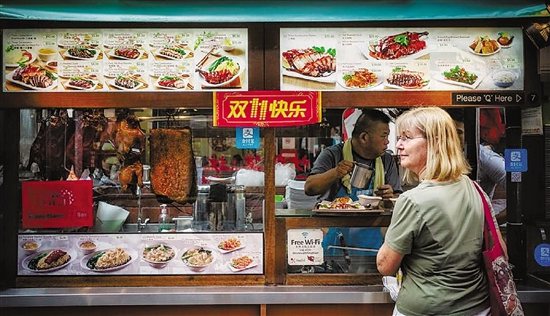


Elements of the Singles Day shopping festival are seen in streets in Singapore.
The upcoming online shopping festival in China is promoting the e-commerce development of Southeast Asia, said Zhejiang Online on Nov. 8.
Through the annual shopping craze, China is connecting with the world via the Internet, and opening its economy in the real world.
Singapore, a country hailed as shopping heaven, had no cultural background of the Singles Day shopping festival, which originated in China and takes place every 11th of November. However, the expanding influence of the Chinese shopping carnival has gradually impacted the Singaporean market.
“With people purchasing online, my business has experienced a sharp drop,” said Abby, a Lion City dress shop owner, adding that she has to make proper adjustments to adapt to the new changes.
Kuala Lumpur, capital city of Malaysia, is also experiencing a similar phenomenon. The Chinese e-commerce giant Alibaba was heavily reported by Malaysian media when it promoted its “24-hour 11.11 Global Shopping Festival” in the country on Nov. 1.
Local newspaper Sin Chew Daily said that Malaysian consumers bought over 1 million dresses from Alibaba’s e-commerce platform Taobao over the last year, and predicted that the shopping festival this year will offer the most relaxing experience and the best discount to local consumers.
Chinese products have found their way into Southeast Asia markets through the shopping craze. China has also become the largest consumer in Southeast Asian countries.
For instance, through cross-border e-commerce, the Malaysian bird’s nest corporation PT Swift Marketing Sdn Bhd has expanded their business to China.
Though the company is currently far from achieving its sales goal this year, its chairman, Tan Chengzhe, has never worried about the situation. The company’s sales surged by 400% on last year’s promotion day, and it is expecting more this year, Tan said.
Currently, online shoppers account for only 3% of the 560 million-people population in Southeast Asia, which suggests huge market potential for e-commerce.
Lazada, the largest Singapore-based e-commerce platform in the region, has attracted nearly 30,000 Chinese merchants within a week in this June on its new shopping site Taobao Collection after it merged with Alibaba. Now the site operates in Malaysia, Singapore, Indonesia, the Philippines, and Thailand.
In addition, Alibaba has also been promoting international capacity cooperation with a spirit of innovation, in a bid to establish a global network of trade, manufacturing, and services.
In 2016, a logistics network linking China and Southeast Asia was jointly built by Alibaba’s logistics arm Cainiao, Lazada, Singapore Post, and cross-border e-commerce solutions provider 4PX Express.
So far, Cainiao has established over 16 warehouses in Southeast Asia that cover all the important business divisions, reducing delivery time from 2 months to 2 weeks.
 Fire brigade in Shanghai holds group wedding
Fire brigade in Shanghai holds group wedding Tourists enjoy ice sculptures in Datan Town, north China
Tourists enjoy ice sculptures in Datan Town, north China Sunset scenery of Dayan Pagoda in Xi'an
Sunset scenery of Dayan Pagoda in Xi'an Tourists have fun at scenic spot in Nanlong Town, NW China
Tourists have fun at scenic spot in Nanlong Town, NW China Harbin attracts tourists by making best use of ice in winter
Harbin attracts tourists by making best use of ice in winter In pics: FIS Alpine Ski Women's World Cup Slalom
In pics: FIS Alpine Ski Women's World Cup Slalom Black-necked cranes rest at reservoir in Lhunzhub County, Lhasa
Black-necked cranes rest at reservoir in Lhunzhub County, Lhasa China's FAST telescope will be available to foreign scientists in April
China's FAST telescope will be available to foreign scientists in April "She power" plays indispensable role in poverty alleviation
"She power" plays indispensable role in poverty alleviation Top 10 world news events of People's Daily in 2020
Top 10 world news events of People's Daily in 2020 Top 10 China news events of People's Daily in 2020
Top 10 China news events of People's Daily in 2020 Top 10 media buzzwords of 2020
Top 10 media buzzwords of 2020 Year-ender:10 major tourism stories of 2020
Year-ender:10 major tourism stories of 2020 No interference in Venezuelan issues
No interference in Venezuelan issues
 Biz prepares for trade spat
Biz prepares for trade spat
 Broadcasting Continent
Broadcasting Continent Australia wins Chinese CEOs as US loses
Australia wins Chinese CEOs as US loses